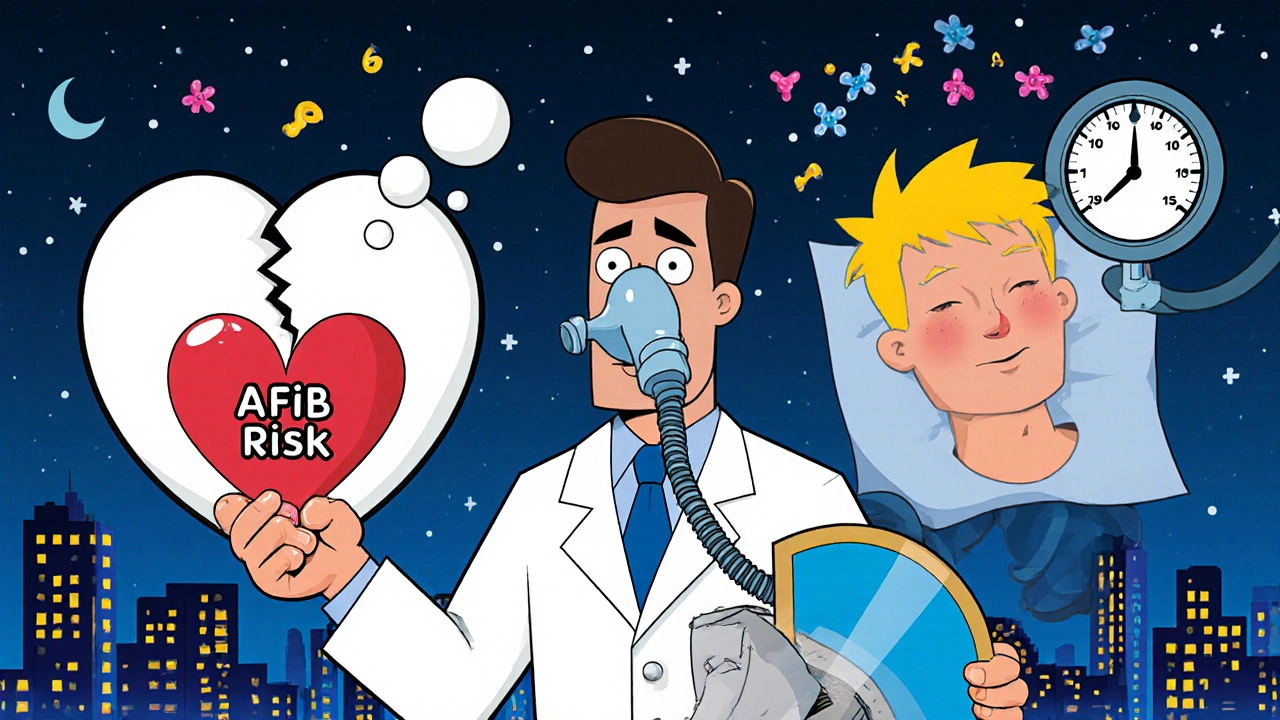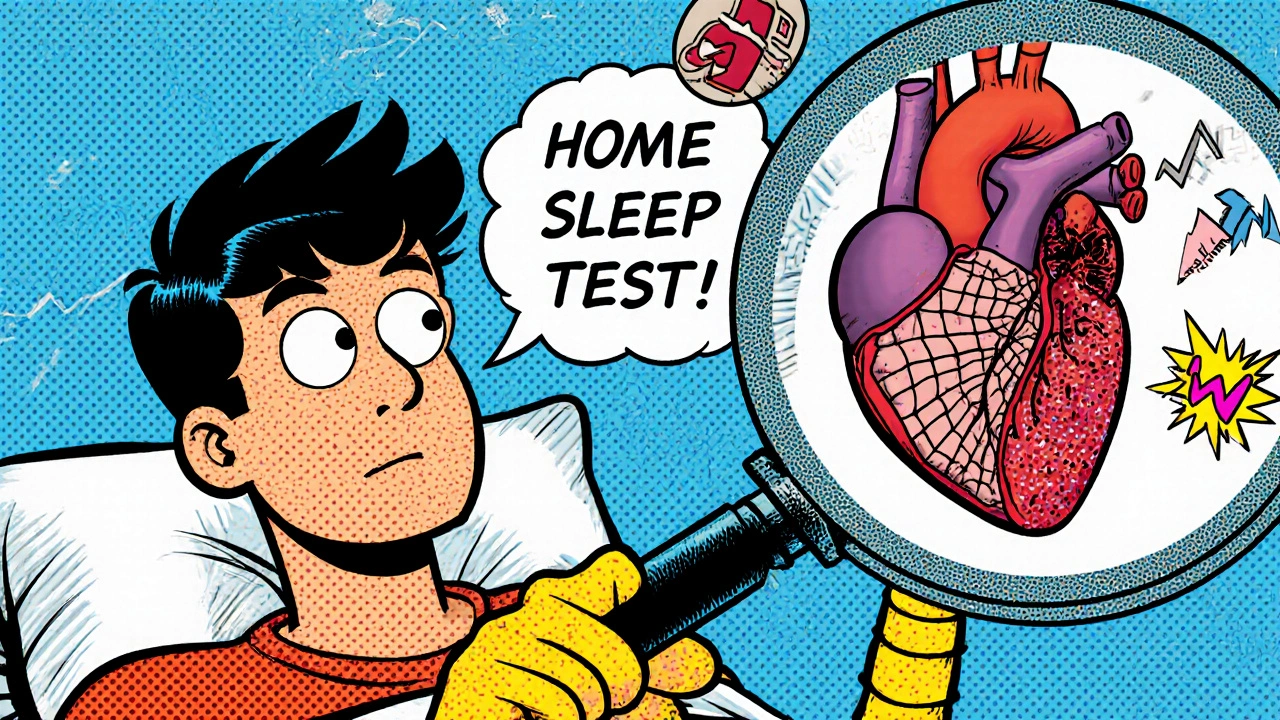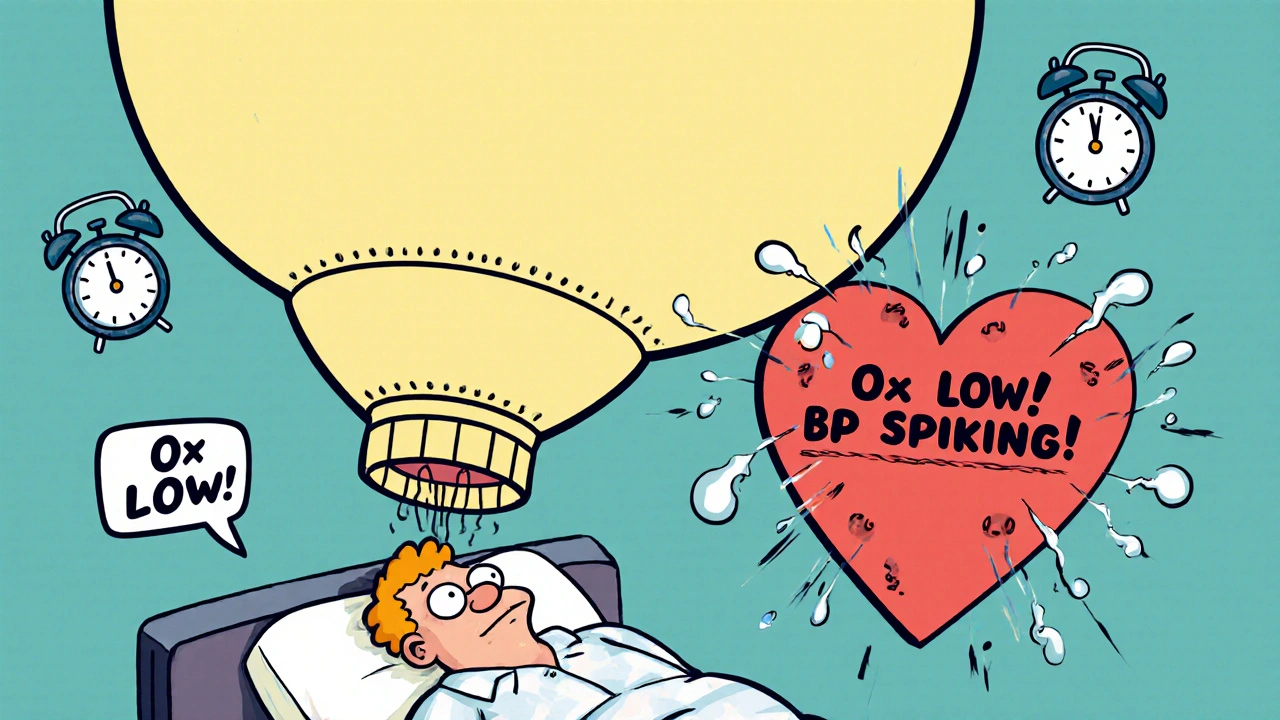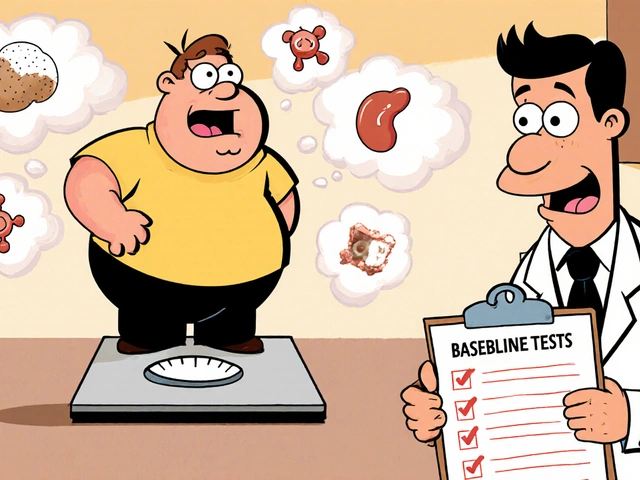Why Your Sleep Apnea Might Be Straining Your Heart
If you snore loudly, wake up gasping, or feel exhausted even after a full night’s sleep, you might have obstructive sleep apnea (OSA). But what most people don’t realize is that this isn’t just a nuisance-it’s a silent threat to your heart. OSA doesn’t just mess with your sleep; it repeatedly shocks your cardiovascular system every time you stop breathing. And the damage adds up over time.
Every time your airway collapses during sleep, your oxygen levels drop. Your body panics. Your heart rate spikes. Your blood pressure surges. This isn’t a one-time event-it happens dozens, sometimes hundreds, of times a night. Over months and years, this constant stress rewires your nervous system, damages your blood vessels, and makes your heart work harder than it should. The result? Higher risk of high blood pressure, irregular heartbeats, heart failure, and stroke.
How Sleep Apnea Spikes Your Blood Pressure
High blood pressure is one of the most common side effects of untreated sleep apnea. But here’s the twist: it’s not just the weight or age that’s causing it. Even if you’re fit and young, OSA can push your blood pressure into dangerous territory.
During an apnea episode, your body senses low oxygen and triggers a fight-or-flight response. Your sympathetic nervous system goes into overdrive-surging with adrenaline. This causes your blood vessels to tighten and your heart to pound. Blood pressure can jump 20 to 40 mmHg in seconds. When this happens every 30 seconds all night long, your body never gets a chance to relax. Over time, your baseline blood pressure stays elevated-even during the day.
Studies show that 30 to 40% of people with high blood pressure have undiagnosed sleep apnea. And for those with resistant hypertension-blood pressure that won’t drop despite taking three or more medications-OSA is often the hidden cause. Treating the sleep apnea, not just the pills, is what finally brings those numbers down. One study found that consistent CPAP use lowers systolic blood pressure by 5 to 10 mmHg on average. That’s the same drop you’d get from cutting salt or losing 10 pounds.
Why Your Heart Starts Skipping Beats
Arrhythmias-especially atrial fibrillation (AFib)-are far more common in people with sleep apnea than in those without. In fact, people with severe OSA are three to five times more likely to develop AFib. Why? Because the repeated drops in oxygen and spikes in pressure create chaos in your heart’s electrical system.
Every time you stop breathing, your heart gets squeezed by pressure changes inside your chest. Then, when you gasp for air, blood rushes back violently into your heart. This mechanical stress, combined with chemical imbalances from low oxygen, makes heart cells fire erratically. Over time, this leads to scarring in the upper chambers of the heart, making it easier for abnormal rhythms to start and stick.
What’s alarming is how much worse OSA makes AFib compared to other risks. While obesity or high blood pressure might raise AFib risk by about 50%, severe sleep apnea bumps it up by 140%. And here’s the kicker: even after treatments like ablation, if you still have untreated OSA, the AFib comes back. One study found that CPAP therapy reduces AFib recurrence by 42% after a year. That’s not a small win-it’s the difference between monthly episodes and occasional ones.

OSA Isn’t Just an Older Person’s Problem
For years, doctors thought sleep apnea was mainly a problem for middle-aged, overweight men. But new research from UT Southwestern Medical Center in 2024 shows that’s outdated. OSA is now being diagnosed in younger adults-even under 40-and it’s just as dangerous.
Younger patients with OSA are showing early signs of heart damage: thickened heart walls, stiffened arteries, and increased fibrosis in the atria. These changes happen silently, without symptoms, until something serious like a stroke or heart attack occurs. The problem? Many young people with OSA don’t get tested. They assume snoring is normal. Or they think they’re too young to have it.
But if you’re under 40, have high blood pressure, or get unexplained fatigue and morning headaches, don’t brush it off. Sleep apnea doesn’t care how old you are. It only cares whether your airway closes at night.
What Happens When You Treat It
The good news? Treating sleep apnea doesn’t just help you sleep better-it can reverse some of the damage to your heart.
CPAP therapy is the gold standard. It works by gently blowing air through a mask to keep your airway open. It sounds simple, but the effects are powerful. People who use CPAP consistently-four or more hours a night-see real improvements:
- Blood pressure drops by 5-10 mmHg on average
- AFib episodes drop by up to 42% after a year
- Left ventricular function improves, reducing heart failure risk
- Many reduce or even stop blood pressure medications
One user on a heart health forum shared that after three months of CPAP, their blood pressure fell from 160/95 to 128/82. Another said their AFib episodes went from weekly to once every two months. These aren’t rare cases-they’re common outcomes for those who stick with treatment.
But adherence is the biggest hurdle. About 30% of people quit CPAP within the first year. The mask feels uncomfortable. The air feels dry. It’s hard to sleep with it on. But most of these problems can be fixed. Humidifiers help with dryness. Different mask styles (nasal pillows, full face, hybrid) can make a huge difference. Starting with a low pressure and slowly increasing it-called ramp mode-makes it easier to adjust. Most people find it comfortable after 2 to 4 weeks.

Who Should Get Tested
You don’t need to be obese or loud to have sleep apnea. If you have any of these, you should get screened:
- High blood pressure, especially if it’s hard to control
- Irregular heartbeat (AFib, PVCs, or other arrhythmias)
- History of stroke or heart failure
- Daytime fatigue, morning headaches, or brain fog
- Snoring, choking, or gasping during sleep (even if you don’t remember it)
- Being under 40 but still having unexplained heart issues
Doctors now recommend screening for OSA in all patients with hypertension, atrial fibrillation, or stroke-because as many as 65% of them have it and don’t know. Home sleep tests are now accurate enough for most people. They’re cheaper, easier, and done in your own bed.
The Bigger Picture: Why This Matters Now
The global market for sleep apnea devices is expected to hit $14.7 billion by 2028. Why? Because doctors and insurers are finally catching on. Medicare and many private plans now cover sleep testing if you have high blood pressure or AFib. The American Heart Association now lists OSA as a Class I risk factor for arrhythmias-meaning it’s on the same level as smoking or diabetes.
And the science keeps getting stronger. New studies show OSA causes actual scarring in the heart muscle. One 2024 study found OSA patients had 2.3 times more atrial fibrosis than those without it. That’s not just a correlation-it’s direct damage.
This isn’t about snoring anymore. It’s about protecting your heart before it’s too late. If you have heart issues and haven’t been tested for sleep apnea, you’re missing a critical piece of the puzzle. And if you’ve been told your high blood pressure or irregular heartbeat is "just aging," ask if sleep apnea could be the real culprit.
What to Do Next
If you suspect you have sleep apnea:
- Track your symptoms: Do you snore? Wake up tired? Have morning headaches?
- Ask your doctor for a sleep study-especially if you have high blood pressure or heart rhythm problems.
- If diagnosed, don’t give up on CPAP. The first few weeks are tough, but most people adapt.
- Try different masks, use humidification, and set the ramp feature.
- Track your progress: note how you feel, your blood pressure, and any changes in heart palpitations.
Sleep apnea isn’t a life sentence. It’s a treatable condition-and treating it might save your heart.
Can sleep apnea cause high blood pressure even if I’m not overweight?
Yes. While obesity increases the risk, sleep apnea can happen in people of any weight. The issue is airway collapse during sleep, not body fat. Even thin people with narrow airways, large tongues, or jaw structure issues can develop OSA. The repeated oxygen drops and pressure spikes from apnea episodes directly trigger high blood pressure, regardless of weight.
Does treating sleep apnea help with atrial fibrillation?
Absolutely. Studies show consistent CPAP use reduces AFib recurrence by 42% after one year. Even if you’ve had a heart procedure like ablation, untreated sleep apnea makes AFib return faster. Treating OSA improves heart rhythm stability by reducing inflammation, lowering blood pressure, and decreasing mechanical stress on the heart.
How long does it take for CPAP to lower blood pressure?
Some people see small drops in blood pressure within weeks, but most see steady improvement over 3 to 6 months. The key is consistency-using CPAP at least 4 hours a night, every night. Blood pressure doesn’t drop overnight, but over time, your body adjusts and the constant nighttime stress on your heart lessens.
Can I use a mouthpiece instead of CPAP for heart protection?
Oral appliances can help with mild OSA and reduce snoring, but they’re not as effective as CPAP for protecting the heart, especially in moderate to severe cases. CPAP is the only treatment proven to significantly lower blood pressure and reduce arrhythmia risk. If you can’t tolerate CPAP, talk to a sleep specialist about alternatives like hypoglossal nerve stimulation-this device has shown strong results in reducing cardiovascular strain.
Is home sleep testing reliable for diagnosing sleep apnea linked to heart problems?
Yes. Modern home sleep tests measure breathing patterns, oxygen levels, and heart rate accurately enough to diagnose OSA in most people. They’re recommended by the American Academy of Sleep Medicine for patients with suspected OSA and no other major health issues. If you have heart failure, COPD, or neurological conditions, an in-lab study may be needed-but for most people with high blood pressure or AFib, home testing is perfect.




